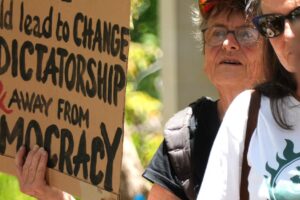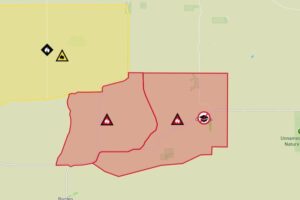
Australian-founded mental health startup Tala Thrive is planning to move its operations back to Melbourne from London, as the startup’s founder reveals details of a previously undisclosed $500,000 pre-seed raise.
Speaking exclusively with SmartCompany, Sonia Kaurah, who founded Tala Thrive in 2023, said the round was formally closed at the end of last year, following a successful crowdfunding campaign that attracted strong investor and community support.
The startup, which raised £220,000 (AU$443,600 at the time of writing) via crowdfunding when Kaurah was based in London, saw additional angel investors, including Duncan Gould, ex-global head of product at Amazon, Feike D, 800x Limited angel syndicate lead and ex VC, and Izzy Obeng, CEO of Foundervine, top up the round to $500,000
Related Article Block Placeholder
Article ID: 320047
The additional capital validated Kaurah’s belief that culturally responsive mental health and coaching services should be a “thing”.
Stemming from the founder’s own experience and frustrations, Tala Thrive connects clients with therapists and coaches who share – or deeply understand – their cultural background, language, and lived experiences.
Smarter business news. Straight to your inbox.
For startup founders, small businesses and leaders. Build sharper instincts and better strategy by learning from Australia’s smartest business minds. Sign up for free.
By continuing, you agree to our Terms & Conditions and Privacy Policy.
From Melbourne to Europe to startup founder
Kaurah’s journey to founding Tala Thrive was deeply personal. When the founder first sought therapy in Melbourne a decade ago, she didn’t expect to feel more alienated walking out than she did walking in.
“One of the first responses she [the therapist] said to me was, ‘Oh, you need to cut your parents out of your life.’ And I was like, yeah, I agree, some of it’s pretty intense… but that wasn’t really quite helpful,” she recalls.
“She didn’t understand the cultural background and the nuances around it.”
Kaurah is a Malaysian-Indian Australian who later lived in Sweden, before moving to London and is now back in Melbourne. She said her experience of trying several therapists in different countries felt like she was paying “to educate her [therapists] about racism”.
“Being born and raised in Melbourne, and …. my parents [are] from Malaysia, and we have a different ethnic background — cultural identity issue was a big thing for me,” she says.
“Growing up, I never really felt properly Australian, and then I would go back to Malaysia every year, and I wouldn’t feel properly Malaysian.”
These experiences led Kaurah, a psychology major from Monash University, to realise something was missing from the world of mental healthcare: cultural context.
But it wasn’t until 2023 that she began formal research by interviewing 200 therapists and coaches and 500 potential users across the globe to shape Tala Thrive’s model.
The platform’s matching algorithm connects users with practitioners based on factors like cultural background, language, religion, and even the generation of migration. It also includes options to address challenges not often found on mainstream mental health platforms, such as visa stress, colourism and racial trauma.
“Some of the things that we ask are not on any other platforms,” she says.
“So, things like visa stress, which is a big thing for immigrants, colourism, racial trauma, cultural identity issues, inter-couple, interracial couples… You actually can’t even pick this as an option on other platforms.”
The challenges of fundraising
Related Article Block Placeholder
Article ID: 325423
Tala Thrive’s crowdfunding campaign, which ran last year, drew widespread support from community investors who resonated with the platform’s mission.
But behind the success was an uphill battle familiar to many underrepresented founders.
“If you ask any female founder — especially a woman of colour founder — I would be super surprised if it was super easy,” says Kaurah. “It was tough.”
Still, her crowdfunding campaign ended up exceeding its target of £150,000 (AU$302,400 at the time of writing).
“I had so many people reach out to me and just be like, ‘This is my story, this is why I think it’s so important, this is why I’m investing.’”
Global reach, local focus
Today, Tala Thrive operates globally, with over 80 practitioners across 30 languages and multiple cultural and religious backgrounds. While therapy services are limited in the US due to licensing laws, users worldwide can access coaching and self-guided programs on the app.
L-R: The affirmation cards and the guided programs by Tala Thrive. Source: Supplied
Beyond therapy, the company has also developed affirmation and conversation cards with culturally specific humour (“Auntie gossip is noise, your inner voice matters more”) and self-guided programs on topics like generational trauma — created in collaboration with experts, including a racial trauma specialist from Columbia University.
“Thrive, not just survive”
The startup’s name – Tala Thrive – itself reflects its dual mission: to normalise speaking about mental health and to shift the focus from survival to thriving.
“I wanted to kind of push a movement around thrive and not just survive,” Kaurah says.
“Tala, in Swedish, means to speak. It just has an R on the end, so I dropped the R.”
The brand’s logo — a subtle smile formed from the letters — pays homage to the masks used in traditional theatre to conceal emotions, symbolising the company’s goal of helping people unmask theirs.
Building toward a more inclusive future
Looking ahead, Kaurah hopes to expand Tala Thrive’s reach through partnerships with governments and corporates to make culturally competent care more accessible — and less reliant on individuals paying out of pocket.
She’s also laying the groundwork for advancing research and standards in culturally competent mental health care.
“There’s not many clinical studies to prove that culturally competent care produces better mental health outcomes,” she says.
“A lot of the mental health assessments used today don’t factor in racial trauma, immigration, sexism… so we’re working with a psychiatrist now to redo a lot of these mental health assessment surveys so that it can be more inclusive.”
For Kaurah, the vision for Tala Thrive has always been clear: to give people of diverse backgrounds a space to be seen, understood, and supported.
“We really care about the impact that we make,” she says.
“I really want to make it accessible for all and inclusive… that’s really where I want to take it.”





